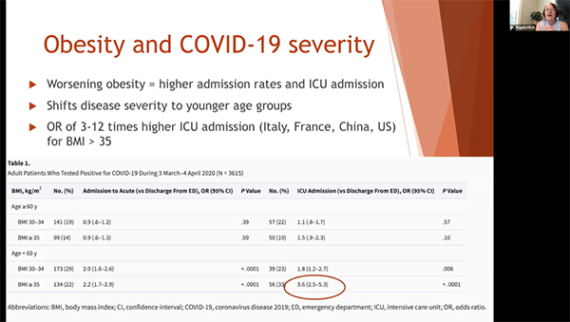Months into the COVID-19 pandemic, we’re still learning – about the virus itself, the impact on people who have it, and how to protect ourselves and others. We’re also learning more about the disease of obesity, which is a pandemic in its own right.
Obesity and COVID-19
 On July 21st, OAC joined the Massachusetts Coalition for Action on Obesity (MCAO) to speak in a webinar about the link between obesity and COVID-19. The webinar was organized by OAC Board Member and volunteer Melinda Watman, BSN, MSN, CNM, MBA, with parts of the presentation led by OAC Ex-officio member Angela Fitch, MD, FACP, FOMA. Special thanks to these two OAC volunteers for taking action and educating! Here is a glimpse at what the research shows:
On July 21st, OAC joined the Massachusetts Coalition for Action on Obesity (MCAO) to speak in a webinar about the link between obesity and COVID-19. The webinar was organized by OAC Board Member and volunteer Melinda Watman, BSN, MSN, CNM, MBA, with parts of the presentation led by OAC Ex-officio member Angela Fitch, MD, FACP, FOMA. Special thanks to these two OAC volunteers for taking action and educating! Here is a glimpse at what the research shows:
- Having obesity-related health conditions, such as type 2 diabetes or sleep apnea, can increase the severity of COVID-19 and lead to more complications.
- Patients with obesity and COVID-19 may be more than three times as likely to be hospitalized and require intensive care.
- More than 93 million Americans, almost 45 percent of the U.S. population, are affected by obesity and struggle to manage the disease.
Shedding Light on Weight Stigma
 The MCAO webinar also shed light on another important topic: weight stigma. OAC President and CEO, Joe Nadglowski, came on as a special guest to share insights about the impact of weight stigma on people with obesity during the pandemic.
The MCAO webinar also shed light on another important topic: weight stigma. OAC President and CEO, Joe Nadglowski, came on as a special guest to share insights about the impact of weight stigma on people with obesity during the pandemic.
Unfortunately, research shows that people with obesity often avoid healthcare settings for fear of being treated poorly because of their weight. Weight bias is a constant issue that people with obesity face daily. Healthcare settings are also one of the most common places where people with obesity report being stigmatized.
“Some patients may avoid seeking help with a COVID case because they are worried they will be denied treatment so medical resources can be rationed for those who do not have chronic illnesses such as obesity,” said Joe Nadglowski. “At a time when COVID-19 is increasing nationwide, we need to ensure that people with obesity who may be experiencing symptoms of COVID-19 are treated with care, dignity and respect in the healthcare setting.”
To watch the webinar and learn more about obesity and COVID-19, Click Here.
A Call to Action
A step in the right direction is to improve patient access to obesity care services and treatment options. Right now in the OAC Action Center, there are two opportunities for OAC supporters and the public to write policymakers about these issues:
- Click Here to contact your state’s members of Congress to support the Treat and Reduce Obesity Act by including its policy provisions in the next COVID-19 relief package.
- Click Here to urge your Governor to prohibit state health plans from excluding coverage for science-based obesity treatment services such as intensive behavioral therapy, FDA-approved obesity drugs and bariatric surgery.
Both of these efforts are important for giving patients with obesity the healthcare they deserve, especially during a time like right now with so much at stake due to COVID-19.
